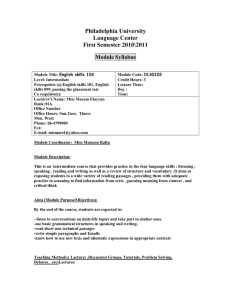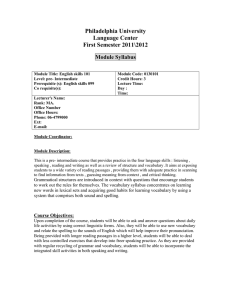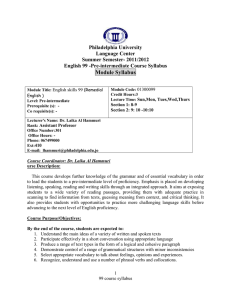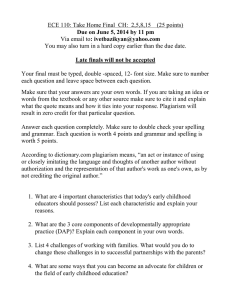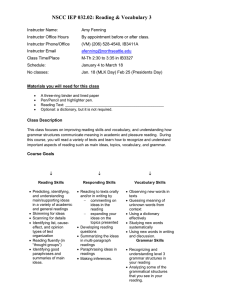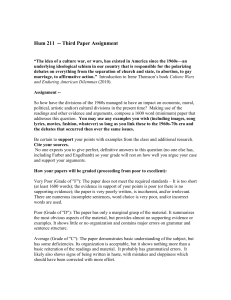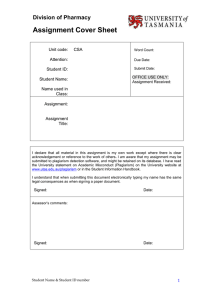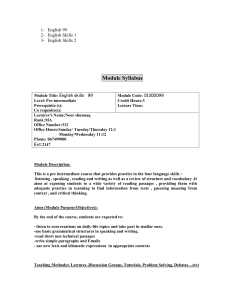Philadelphia University Language Center First Semester 2010\2011 Module Syllabus
advertisement
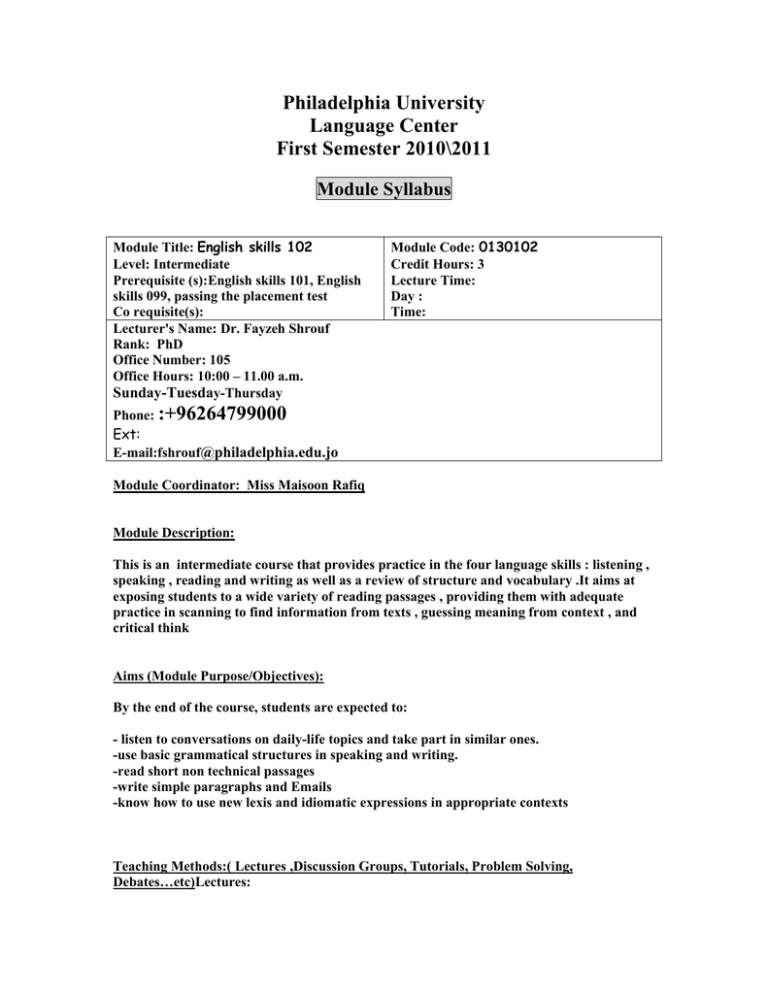
Philadelphia University Language Center First Semester 2010\2011 Module Syllabus Module Title: English skills 102 Level: Intermediate Prerequisite (s):English skills 101, English skills 099, passing the placement test Co requisite(s): Lecturer's Name: Dr. Fayzeh Shrouf Rank: PhD Office Number: 105 Office Hours: 10:00 – 11.00 a.m. Sunday-Tuesday-Thursday Module Code: 0130102 Credit Hours: 3 Lecture Time: Day : Time: Phone: :+96264799000 Ext: E-mail:fshrouf@philadelphia.edu.jo Module Coordinator: Miss Maisoon Rafiq Module Description: This is an intermediate course that provides practice in the four language skills : listening , speaking , reading and writing as well as a review of structure and vocabulary .It aims at exposing students to a wide variety of reading passages , providing them with adequate practice in scanning to find information from texts , guessing meaning from context , and critical think Aims (Module Purpose/Objectives): By the end of the course, students are expected to: - listen to conversations on daily-life topics and take part in similar ones. -use basic grammatical structures in speaking and writing. -read short non technical passages -write simple paragraphs and Emails -know how to use new lexis and idiomatic expressions in appropriate contexts Teaching Methods:( Lectures ,Discussion Groups, Tutorials, Problem Solving, Debates…etc)Lectures: - 3 hours per week -Class discussion and group work -Oral presentation: students are required to conduct an oral presentation on a topic of their choice -Written assignment Course/ Module Components: 1. Books (title ,author(s),publisher, year of publication) -Cunningham, Sarah and Moor, Peter, New Cutting Edge, Intermediate, Student's books.(Longman) -New Cutting Edge, Intermediate, Class cassettes 2 and 3.(Longman) 2. Support Material(s): a/v materials -Class cassettes\CDs-videos –companion web site. -Offer activities for teacher and students support work sheet web quest and online dictionary. 3. Supplementary Readings (Books, Periodicals….. etc) 4. Study Guide(s) (if available) 5. Homework and Laboratory Guide(s) (if applicable): Students should visit the library to do their assignments. Contribution to Program Learning Outcomes: Intended Learning Outcomes:(Knowledge and Understanding, Cognitive Skills, Communication Skills, Transferable skills). With respect to the following skills, students are expected to: a. Knowledge & Understanding: Reading -Reading and understanding various texts -Pinpointing main ideas in the text and finding information by scanning Listening -Comprehending different dialogues and conversation by native speakers -Understanding different accents - Learning about idiomatic expressions and slang words Speaking -producing clear language Writing - identifying basics of writing B .Cognitive Skills (Thinking & Analysis) Developing students' own critical thinking skills Reading -Understanding major details and information in different texts -Identifying main ideas and how they are presented in a text -Developing their own critical thinking skills -Predicting text content through the use of synonyms linking words reference words title clue pictures and illustrations -Recognizing author’s style evaluate reading views -Using different reading strategies for different texts - Analyzing facts easily Listening -Analyzing different dialogues and conversation by native speakers Writing: - identifying topic sentences -Evaluating good and bad paragraphs -Analyzing paragraphs elements C-Communicative Skills (personal and Academic) Reading -discussing the topic with students in small discussion groups and encouraging students to present their point of view and work individually or within a team Listening & Speaking -Students become more confident of their speaking abilities and communicate easily with their instructor -Students participate in class and give an oral presentation Writing Writing coherent paragraphs d. Practical and Subject Specific Skills (transferable Skills) Reading Scanning a text to find information in news paper articles, factual scientific texts, stories quizzes, notes and letters. Reading with fluency and accuracy. Listening Analyze interviews, stories and conversations Speaking - It's based around realistic topics and situations. -Practicing of grammar and lexis through oral activities - Speaking about self, family etc -Using language for interaction -Using language communicatively in real life situations Writing -Recognizing different methods of paragraph development -Recognizing the relation between topic sentence and the discussion of a paragraph -Writing emails, reviews, using linkers Assessment Instruments Modes of Assessment Score First Exam Second Exam Assignments / Seminars / Projects / Quizzes / Tutorials ,Reports, Research Projects, Presentations Final Exam Total 15 15 20 50 100 Date Documentation and Academic Honesty Students are expected to complete all homework, papers and projects independently (unless otherwise specified); any work must be yours and yours alone. Working together for anything other than data collection, relying on students' work from previous semesters and/or plagiarizing published research is considered cheating. 1. Documentation Style (with illustrative examples) References: Books: All books are available at the library Reading References: 1. Stephen, Krashen.( 2004).The Power of Reading Insights from the Research. Westport. 2. Goatly, Andrew.(2000).Critical Reading and Writing : An Introductory Case Book . Routledge . 3. Heavers, Kathy &Coman, Marcia. (1991). What you Need to Know about Reading Comprehension and Speed, Skimming and Scanning &Reading for Pleasure. Lincolnwood. 4. Fairbairn, Gavin (1991). Reading, Writing and Reasoning: A Guide for Students .Open University Press. 5. Alastair, Sharp.(2003). Reading Comprehension and Text Organization. Edwin Mellwn Press. Writing References: 1. Frank, O’Hare & Robert Funk (2000).The Modern Writer’s Handbook. Allyn &Bacon 2. Phyllis, Crème &Mary Lea.( 1997). Writing at University: A Guide for Students .Open University Press 3. Raimes, Ann (1999). Keys for Writers: A Brief Handbook. Houghton Mifflin Company. Speaking References: 1. Theibert, Philip. (2003). How to Give a Damn Good Speech . Jaico Publishing House 2. Gronbeck, Bruce. (1991).Principles of Speech Communication. Harper Collins 3. Griffin, Jack. (1994) How to Say it Best : Choice Words , Phrases Griffin .Prentice Hall Vocabulary References: Redman, Stuart .(2003).English Vocabulary in Use Pre intermediate and Intermediate .Cambridge University press . Grammar: 1.Azar,Betty .( 1989)Understanding and Using English Grammar Prentice Hall. 2.Woods , Edward & Nicloe Mcleod. (1990) .Using English Grammar .Prentice Hall. 3. Murphy,Raymond.(1989) English Grammar in Use. Cambridge University Press 4. Thomson A & Martinent ,( 1994). A Practical English Grammar Oxford University Press 2. Protection of Copyright Publications in all forms require permission from the copyright owner in advance. You are not allowed to reproduce, store in a retrieval system, or transmit, in any form or by any means, electronic, mechanical, photocopying, recording or otherwise, without the prior permission of the publisher or a license from the Copyright Licensing Agency Limited. (www.cla.co.uk). Students are expected to respect and uphold the standards of honesty in all their activities. Any cheating or plagiarism will result in disciplinary action to be determined by the instructor based on the severity and nature of the offense. 3. Avoiding Plagiarism Plagiarism is a serious academic offense that will result in your failing the course. Learning notes by heart and repeating the information word by word in the exam is a type of plagiarism. Course / Module Academic Calendar: Week 1 2 3 4 5 6 First exam 7 8 9 10 11 Second Exam 12 13 14 15 Specimen Exam ( optional) 16 Final Exam Basic & support material to be covered Module 5 Module 5 Module 5 Module 6 Module 6 Module 7 22-30/11/2010 Module 7 Module 8 Module 8 Module 10 Module 10 22-30/12/2010 Module 11 Module 11 Module 12 Module 12 Revision Homework \Reports and their due dates Expected Workload: On average students are expected to spend at least (2) hours of study for each 50- minute lecture/ tutorial. Attendance Policy Absence from lectures and /or tutorials shall not exceed 15% . Students who exceed the 15% limit without a medical or emergency excuse acceptable to and approved by the Dean of the relevant college /faculty shall not be allowed to take the final examination and shall receive a mark of zero for the course. If the excuse is approved by the Dean, the student shall be considered to have withdrawn from the course. Module/ Course Policies: 1. You are allowed up to (5) absences on Mondays/Wednesdays or (7) absences on Sundays/Tuesdays/Thursdays. If you exceed this number, you will fail the course. 2. Tardiness will not be tolerated. If you come to class after I take attendance, you are welcome to attend, but you will be considered absent. 3. Plagiarism is a serious academic offense that will result in your failing the course. 4. Learning notes by heart and repeating the information word by word in the exam is a type of plagiarism. 5. Participation is and essential parts of course work. It does not merely mean coming to class; it involves preparing before hand and playing an active role in class discussion. 6. Make-up exams will be offered for valid reasons only with the consent of the Dean.
